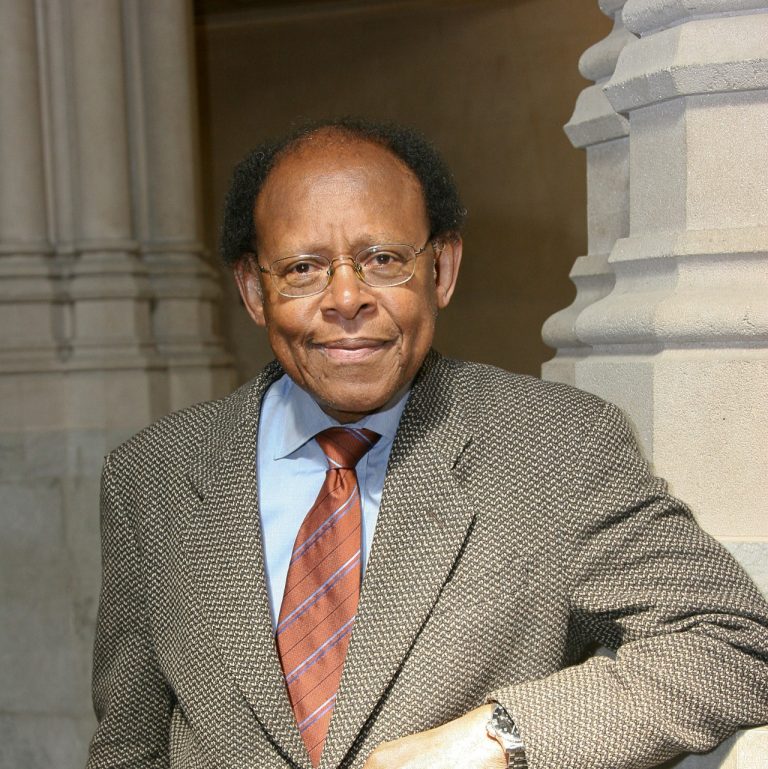This story was originally published on September 29, 2017.
An Introduction to James Cone, by Larry Perry II, PhD
Rev. Dr. James Cone (above in a courtesy photo/© Tom Zuback) is the most provocative theologian America ever produced. His classics Black Theology and Black Power, A Black Theology of Liberation, God of the Oppressed, and Martin & Malcolm & America push readers to understand Christianity as a tool for the oppressed’s liberation. Specifically, Cone pushes American Christians to act on Christianity’s call to stand on the side of “the least of these”—Black people, the poor, women, Latinx communities, LGBTQIA communities, among other groups suffering throughout the world. Cone’s latest book The Cross and the Lynching Tree interprets Jesus’s crucifixion as a first-century lynching, challenging American Christianity’s historical failure to address racial violence and White supremacy.
Cone stands within a long legacy of Black theological voices who have called for racial justice in America, among them Frederick Douglass, Sojourner Truth, David Walker, Julia Foote, Maria Stewart, Henry McNeal Turner, Alexander Crummel, Reverdy Ransom, Mordecai Johnson, Benjamin Mays, Howard Thurman, Martin Luther King Jr., Malcolm X, and Pauli Murray, not to mention a host of others. Cone was the first trained Black theologian to push White theologians to engage the issue of race in America.
In his book, A Black Theology of Liberation, Cone called out White theologians who, “would prefer to do theology without reference to color. . .” Further, Cone highlighted how this color-blind approach, “reveal[ed] how deeply racism is embedded in the thought forms of their culture,” as they stood virtually inept to translate “the biblical emphasis on liberation to the black-white struggle today.” Indeed, Cone ushered readers towards a theology that reflected the burnishing truths of the Black American experience.
Through a complex yet accessible interweaving of Christian symbols, Western Philosophy, Christian theology, Black history and culture, Cone has distilled his theological vision for racial justice. At once, Cone’s vision bears witness to the ugliness of race relations in America, and hope for a racial redemption. Cone’s work cuts deep into the American consciousness, as America often has characterized herself as a Christian nation—even “with its history of injustice to the poor especially the black man and Indian,” as Cone has pointed out. With the current horrors of race relations in America—found in the constant killings of unarmed Blacks, the disproportionate incarceration rate of Black and brown people, race-based economic inequality, and the racist dissonance projected by the Trump enthused political-right—Cone’s voice is one to which we must all continue to listen.
For over forty years, Cone’s work as a theologian has shaped much of Black theological discourse. As a professor at Union Theological Seminary in the City of New York, James Cone has helped to shape and train students for life as church leaders and professors. His courses and published works have influenced several generations of scholars and preachers, whom he has always pressed to “Find [their voice,” in order to speak to the injustices faced in their moment and social situation. One can only hope that Cone’s work—as a scholar and a professor—will continue to light the flames of theological imagination and influence even more students’ engagement with religion, race, and public life.
In the interview featured above, conducted and recorded on a noisy New York City afternoon in the fall of 2014 by StayUp.News editor-in-chief Roberto E. Alejandro, Cone narrates the path and arc of his theology, the challenge his Christianity faced from the Black Power Movement, and his attempt to synthesize the intellectual trajectories of Black Christianity and Black Power. Cone also addresses the project history has seemingly forced on Black Christianity in the United States, to redeem a foundationally racist political project, and why he would rather belong to a history of liberation, than to a history of oppression.
Larry S. Perry, II is a Visiting Researcher at Georgetown University’s Department of Theology and holds a Ph.D. in Religious Studies from the University of Virginia, where he concentrated in American Religious History. Dr. Perry’s work focuses on the history of the American Religious Left, and his current book project is titled, A Black Spiritual Leftist: Howard Thurman and the Religious Left’s Unfinished Business of Race Relations, an intellectual and political biography of the life of the 20th-century philosopher, mystic, minister, and activist, Howard Thurman.
StayUp.News documents poverty in America through Hip-Hop, amplifying unheard voices in a language all their own. But we can’t do it without you. Support this important mission:

